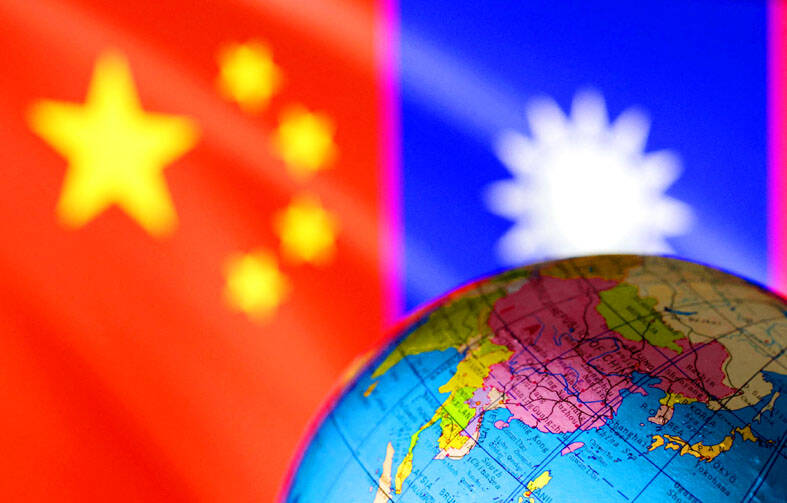President William Lai’s (賴清德) stopovers in Hawaii and Guam during his first overseas trip to Taiwan’s Pacific diplomatic allies are indicative of a Taiwan-US alliance to counter China’s Belt and Road Initiative (BRI), a Taipei-based security expert said on Sunday.
Lai arrived in Hawaii on Saturday for a two-day stopover on his trip to Palau, Marshall Islands and Tuvalu, and is scheduled to make a stopover in Guam on his return trip.
Lai’s trip is set to “link” the first, the second and third island chains, said Su Tzu-yun (蘇紫雲), a research fellow at the government-funded Institute for National Defense and Security Research.

Photo: Reuters
Taiwan is on the first island chain, while Guam and Palau are along the second island chain, and Hawaii is on the third island chain, Su said.
The three island chains are strategically important for curbing China’s expansionism and, in particular, the BRI, he said.
The first island chain is the “first line of defense” against Chinese expansionism and a critical maritime route for fuel, with Taiwan at the center of this chain, Su said.
As China is building deep-water harbors in the Solomon Islands and Peru and a space tracking station in Kiribati, fortifying the second island chain aids efforts to defend the first island chain is in the interest of the US and its allies, he said.
Meanwhile, open-source data showed that the George Washington Carrier Strike Group (CSG) is deployed in Yokosuka, Japan, while the Abraham Lincoln CSG is in Port Klang, Malaysia, and the USS Carl Vinson supercarrier is in the East Pacific.
Asked if such deployments were made to deter China from overreacting to Lai’s passing through the US state and territory, Association of Strategic Foresight research fellow Chieh Chung (揭仲) said they were aimed to deter China, but were unlikely related to Lai’s itinerary.
Academics have said that there is a high possibility Lai’s transit stops in the US could trigger Beijing, causing it to hold large-scale military exercises near Taiwan, in part to “set the ground rules” for US president-elect Donald Trump regarding Taiwan.
However, this is unlikely as such a tactic could irritate Trump and have the opposite effect, the academic added.
Rather, the move is likely intended to warn China not to engage in any unnecessary or provocative behavior in the Taiwan Strait in the run-up to Jan. 20, when Trump is to be inaugurated, he added.
The first island chain refers to the archipelago consisting of the Aleutian Islands, the Japanese archipelago, South Korea, the Ryukyu Islands, Taiwan, the Philippines and the Greater Sunda Islands.
The second island chain refers to the Izu Islands, the Bonin Islands, the Mariana Islands, the Caroline Islands, Guam, Palau and Halmahera Island.
The third island chain refers to Alaska, Hawaii, US- governed Pacific Islands, Australia and New Zealand.

Palauan President Surangel Whipps Jr arrived in Taiwan last night to kick off his first visit to the country since beginning his second term earlier this year. After arriving at Taoyuan International Airport at around 6:30 pm, Whipps and his delegation were welcomed by Minister of Foreign Affairs Lin Chia-lung (林佳龍). Speaking to gathered media, the Palauan leader said he was excited and honored to be back in Taiwan on his first state visit to Taiwan since he was sworn in this January. Among those traveling with Whipps is Minister of State Gustav N. Aitaro, Public Infrastructure

President William Lai (賴清德) yesterday thanked Palau for its continued support of Taiwan's international participation, as Taipei was once again excluded from the World Health Assembly (WHA) currently taking place in Switzerland. "Palau has never stopped voicing support for Taiwan" in the UN General Assembly, the WHO and other UN-affiliated agencies, Lai said during a bilateral meeting with visiting Palau President Surangel Whipps Jr. "We have been profoundly touched by these endorsements," Lai said, praising the Pacific island nation's firm support as "courageous." Lai's remarks came as Taiwan was excluded for the ninth consecutive year from the WHA, which is being held in

RESOLUTIONS DEBATE: Taiwan’s allies said that UN and WHA resolutions cited by China and other nations ‘do not determine Taiwan’s participation in WHO activities’ A proposal to invite Taiwan to this year’s World Health Assembly (WHA) was rejected on Monday, resulting in Taipei’s absence from the annual meeting for a ninth consecutive year, although partners spoke up for Taiwan’s participation at the first day of the meeting. The first agenda item after the opening was a “two-on-two debate” on a proposal to invite Taiwan to participate at the WHA as an observer. Similar to previous years, two countries made statements in favor of the proposal, while two others expressed their opposition. Philippine Secretary of Health Teodoro Herbosa, president of the 78th WHA, accepted the WHA General Committee’s

At least three people died and more than a dozen were injured yesterday afternoon when a vehicle struck a group of pedestrians in New Taipei City’s Sansia District (三峽). The incident happened at about 4pm when a car rammed into pedestrians at an intersection near Bei Da Elementary School. Witnesses said the sedan, being driven at a high speed, ran a red light, knocking scooters out of the way and hitting students crossing the road before careening into a median near the intersection of Guocheng and Guoguang streets. The incident resulted in three deaths and 13 injuries, including the driver, a 78-year-old man